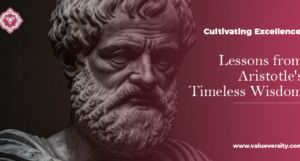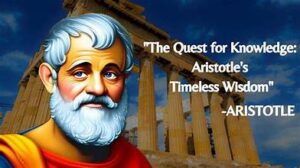
In the ever-evolving landscape of leadership, ancient wisdom often provides insights that remain profoundly relevant. Aristotle, a seminal figure in Western philosophy, offers timeless lessons that can significantly enhance modern leadership strategies. By delving into Aristotle’s philosophy, contemporary leaders can uncover valuable principles that transcend time and context. This article explores how Aristotle’s wisdom can be harnessed to transform and elevate leadership practices in the 21st century.
1. The Virtue of Leadership: Aristotle’s Ethical Framework
Aristotle’s concept of virtue ethics is foundational to his philosophy. According to Aristotle, virtues are character traits that lie between excess and deficiency. For leaders, embodying virtues such as courage, temperance, and justice is essential. Modern leaders can apply this ethical framework by striving for a balanced approach to decision-making, ensuring that their actions are both morally sound and effective.
Key Takeaway: Effective leadership involves cultivating virtues that balance personal and professional responsibilities, fostering a culture of integrity and ethical behavior within organizations.
2. The Role of Eudaimonia: Leading with Purpose and Fulfillment
Aristotle’s notion of eudaimonia, often translated as “flourishing” or “well-being,” emphasizes living a life of purpose and fulfillment. For leaders, this concept translates into aligning their personal values with organizational goals, thereby inspiring their teams. Leaders who lead with a sense of purpose create environments where employees feel motivated and engaged.
Key Takeaway: Leaders should strive to align their actions with their core values and create a vision that resonates with their teams, fostering a sense of purpose and collective achievement.
3. Practical Wisdom (Phronesis): The Art of Sound Decision-Making
Aristotle distinguishes between different types of knowledge, with phronesis, or practical wisdom, being particularly relevant to leadership. Practical wisdom involves making decisions based on experience, context, and ethical considerations. Modern leaders can benefit from developing this type of wisdom by seeking diverse perspectives, learning from experiences, and making informed decisions that consider both short-term and long-term consequences.
Key Takeaway: Emphasizing practical wisdom in decision-making helps leaders navigate complex situations with a balanced approach, integrating ethical considerations and practical experience.
4. The Doctrine of the Mean: Balancing Ambition and Humility
Aristotle’s doctrine of the mean advocates for moderation and balance in all aspects of life. For leaders, this means balancing ambition with humility. Effective leaders are ambitious but not overly self-serving; they seek to achieve goals while remaining grounded and approachable. This balance fosters trust and respect among team members, leading to more cohesive and productive work environments.
Key Takeaway: Leaders should balance their drive for success with humility, creating an environment where ambition does not overshadow collaboration and respect.
5. Leadership and Rhetoric: The Art of Persuasion
Aristotle’s work on rhetoric emphasizes the power of persuasion through ethos (character), pathos (emotion), and logos (reason). Effective leaders use rhetoric to communicate their vision, motivate their teams, and influence stakeholders. By mastering the art of persuasion, leaders can articulate their ideas compellingly and rally support for their initiatives.
Key Takeaway: Developing rhetorical skills enables leaders to communicate more effectively, inspiring and engaging their teams and stakeholders through credible, emotional, and logical appeals.
6. Aristotle’s Politics: Building a Harmonious Team
In his work on politics, Aristotle explores the nature of the ideal state and the role of citizens. Applying these principles to leadership involves creating a harmonious and collaborative team environment. Leaders should focus on building strong, supportive relationships within their teams, ensuring that each member feels valued and contributes to the collective success.
Key Takeaway: Fostering a collaborative and supportive team environment is crucial for achieving organizational goals and maintaining high levels of employee satisfaction.
7. Learning from Failure: Aristotle’s Views on Resilience
Aristotle’s philosophy acknowledges the inevitability of failure and the importance of resilience. Leaders should view setbacks as opportunities for growth and learning. By adopting a mindset that embraces challenges and learns from failures, leaders can cultivate resilience and drive continuous improvement within their organizations.
Key Takeaway: Leaders should approach failures as learning experiences, using them to build resilience and drive ongoing growth and development.
Conclusion: Integrating Aristotle’s Wisdom into Modern Leadership
Aristotle’s wisdom provides a rich tapestry of insights that can transform modern leadership strategies. By integrating principles such as virtue ethics, eudaimonia, practical wisdom, balance, effective rhetoric, and resilience, contemporary leaders can enhance their effectiveness and foster more dynamic, ethical, and successful organizations. As leaders strive to navigate the complexities of the modern world, Aristotle’s timeless wisdom offers a valuable guide for achieving both personal and organizational excellence.
Call to Action: Embrace Aristotle’s principles in your leadership approach and witness how these timeless insights can drive positive change and lasting success in your organization.

